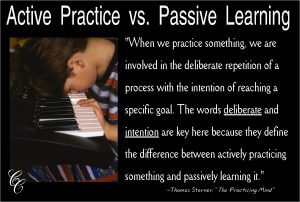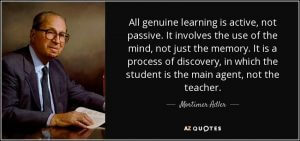 The Active Mindset: A Sure Way To Avoid All Boredom With Life ((this article is a little chunky... it needs a serious rewrite... so if you found it chunky, come back later and check... after I whip it into shape...))
The Active Mindset: A Sure Way To Avoid All Boredom With Life ((this article is a little chunky... it needs a serious rewrite... so if you found it chunky, come back later and check... after I whip it into shape...))I stumbled on an article that addresses an issue I have been seeing... and sheds light at what has been invisible to me, at the why of it: why people are not curious, why people have no questions, why people are afraid of idleness, why people choose busyness instead of doing something that is worth doing.
It"s everywhere. It"s nearly everybody. It is why you have a hard time falling asleep... or conversely why you fall asleep as soon as you put your head on the pillow. Both are symptoms of the same invisible.
It"s what drives you to busyness... to reading everything, to watching every video, to play video games incessantly, to talking without taking a breath, to overwhelming yourself and never doing anything well.
It"s your inability to think... instead of having thoughts. You have thoughts in the mind... and would think outside of the mind.
 You have no control over the thoughts you have... but you could learn to come out of the mind... I teach two methods in my upcoming two courses, Reading and Sleeping...
You have no control over the thoughts you have... but you could learn to come out of the mind... I teach two methods in my upcoming two courses, Reading and Sleeping...Active thoughts, the result of thinking, are much more complex than passive thoughts. Active thinking is a form of critical thinking. It is analyzing information
The difference between thinking and having thoughts.
The "having thoughts" is repetitive, circular, leading to no resolution, dealing with the past, or dealing with the future... fear based, and fruitless.
Being an active thinker is both a thinking capacity that needs the spiritual capacity of curiosity, and a habit.
Most people I muscle test have one spiritual capacity open, and it is definitely not curiosity.
Given the way we are brought up, we are passive thinkers only... (having thoughts, no thinking) to one degree or another. It can be measured by me, and I have decided to add this measure to my Starting Point Measurements.
The main criteria is to what degree you need outside stimulation... the wanting to, needing to, having to, and should. To what degree you need excitement that comes from the outside, people, the internet, your cell phone, movies, even books to engage you so you never have to be alone. Because you are boring for yourself. You don"t know what to do with yourself.
You are not good company... and you would die of boredom if you had to be in solitary confinement.
You live in a train that is the cave of your mind... and reality, outside of the train is passing you by. You are not curious, you are unaware of, or ignore the tugging of your "soul"... and you live a make believe life.
 You are boring and you are bored. And yet you avoid coming off the train, coming out of the mind, living an active life, learning new skills, taking risks that keep you out of the mind... that would help you develop critical thinking, thinking for yourself, and enjoying your own company.
You are boring and you are bored. And yet you avoid coming off the train, coming out of the mind, living an active life, learning new skills, taking risks that keep you out of the mind... that would help you develop critical thinking, thinking for yourself, and enjoying your own company.Here is the article I read... its truth value is 10%: low. What"s missing for it to be higher truth value? It"s thin... there is a lot more in that rabbit hole.
Passive vs active thinking
“I’m bored.” When’s the last time you said that? I bet not too long ago.
If you give me 4 minutes, I’ll tell you why that’s a bad sign.
In the past, I always looked at other people for answers. When you’re little, your school teachers tell you what to do every day. That’s the system at primary school, high school, college, and university.
It’s always one person who tells a group what to do. What does that do to people?
School systems train us to be passive. And after we get out of school, nothing really changes. When I had my first job, I listened to my boss about what to do.
And when I started my first business with my dad, I looked at him for answers.
Now, you might think that this is a matter of experience. That’s the most obvious idea. We think:
“When I’m junior, I take orders. When I’m senior, I give orders.”
That’s about the worst mindset you can have because it’s too passive. Instead, it’s much more beneficial for our career to adopt an active mindset.
What’s the difference between a passive and active mindset? And how do we even form an active mindset? I have three-step-process that I’ve used to transform my own mindset. Feel free to use it too.
Step 1: Acknowledge that passivity is bad
So when I talk about being bored, I’m not talking about being bored in a good way. Sometimes the best ideas come to us when we’re fully relaxed. That’s good.
For the sake of this article, I’m talking about when we say I’m bored in an “I have no idea what I’m doing” type of way.
Do you recognize that feeling? It’s a sense of aimlessness.
Now, to a degree, no one knows what they are doing. The difference is that when you’re always bored with life, you’re not trying.
And people who don’t try are losers. You know why? Life is fascinating—but you must try to experience it.
There’s nothing cool about not having your shit together. You can’t go through life as a passenger.
At some point, you must take over the wheel and decide where you’re going next. That’s the difference between people who have an active mindset and people with a passive mindset.
The former owns his destiny. The latter leaves it up to others.
Step 2: Commit to learning
The Stoic philosopher Seneca put it best in On The Shortness Of Life:
“If you apply yourself to study you will avoid all boredom with life, you will not long for night because you are sick of daylight, you will be neither a burden to yourself nor useless to others, you will attract many to become your friends and the finest people will flock about you.”
That’s why I believe an active mindset has nothing to do with experience. I know interns who are more curious and ask more questions than most senior managers.
But having an active mindset has nothing to do with age or experience.
For example, an insurance consultant in his sixties—who I work with—is as curious as an intern. He’s enthusiastic about everything you talk to him about.
The other day I visited a printing company with my brother. The owner, a third-generation business owner, took over the business from his father years ago. He gave us a full tour and showed us the old printing presses they used, etc.
My brother and I were genuinely interested. The printing press, developed by Johannes Gutenberg, is the greatest invention for human progress. Without books, we wouldn’t be where we are today. That’s fascinating to me.
The owner said, “I’ve never met anyone who actually asked about how we print our books, magazines, flyers, etc.”
Not many people commit to learning. That’s why so many people are always bored. That shouldn’t be a surprise to you by now.
Step 3: Add value
If you apply step 2, adding value becomes easy. When you’re curious and ask questions, you learn. And when you learn, you will have more knowledge and ideas.
When you have ideas, you can use them to improve your life, work, business, etc. That’s the logic.
But that doesn’t mean you should blatantly share your ideas and advice with everyone. You know why?
Just because you have a good idea or piece of advice, it doesn’t mean you must tell the other person about it. People get offended quickly.
The reasons is that advice can be perceived as criticism.
Dale Carnegie writes about it exhaustively in How To Win Friends And Influence People. You must be subtle when you try to add value. Carnegie says:
Don’t criticize, condemn, or complain
Give honest and sincere appreciation
Arouse in the other person an eager want—It’s much better to let people realize something by themselves instead of trying to force them.
Sometimes people email me and say that I need to change something about my blog. “Your articles are too long!” Someone recently said. He clearly never read Carnegie.
When it comes to adopting an active mindset; more knowledge will not help you—only action will. People with a passive mindset think that’s common sense. They’re quick to think they already know things.
But as you and I both know; it’s not about what you know it’s about what you do.
The most important thing is that we commit to learning. If you stay assertive and try to help people (who want to be helped) in life and business, you’ll never be bored. Plus, you’ll keep making progress.
And making progress (no matter how little) is the sure sign that you have an active mindset.
No comments:
Post a Comment